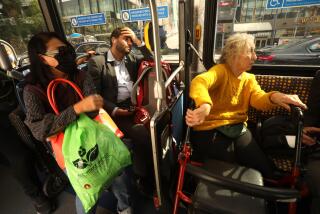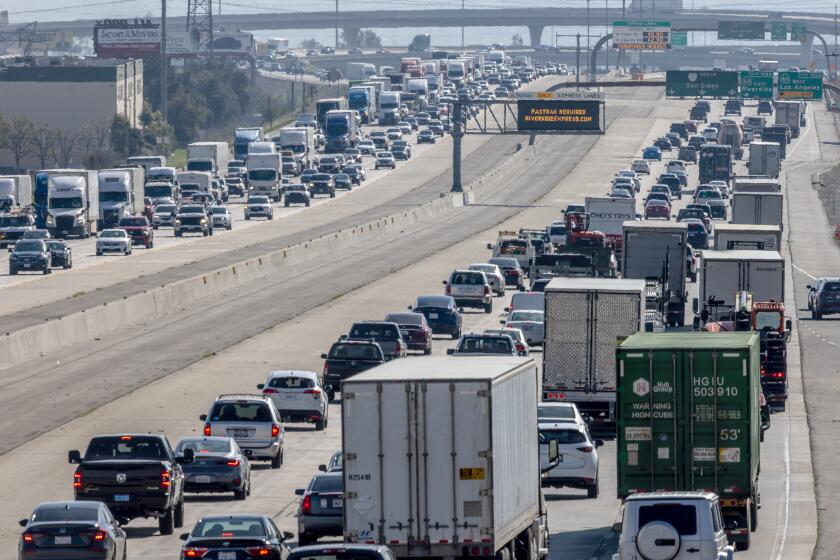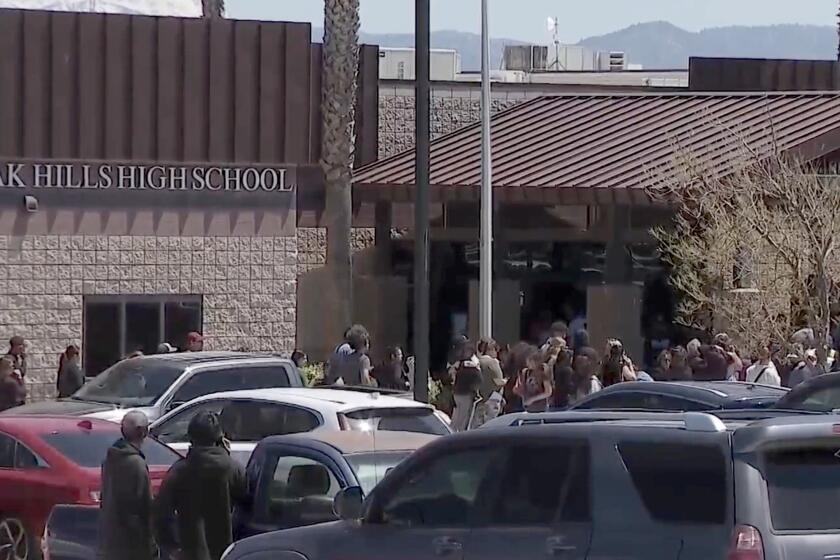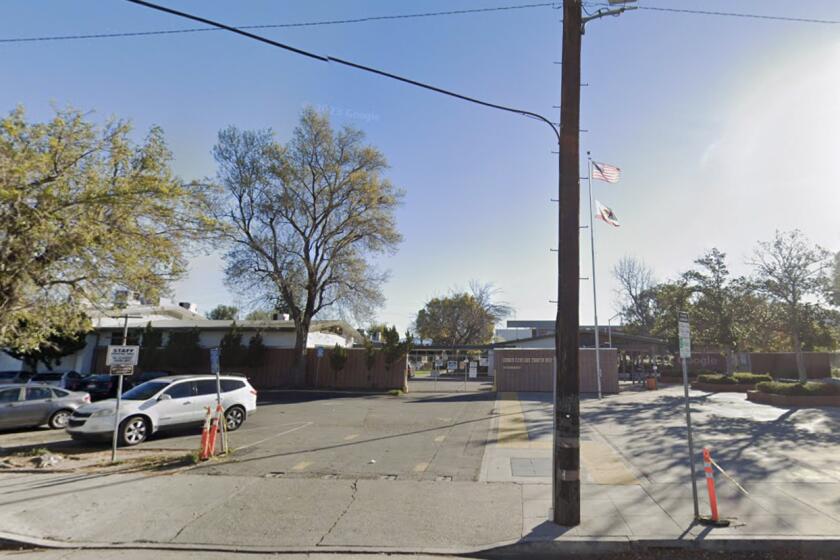On the corner, making a living collides with quality of life
Our leader had a megaphone strapped over his shoulder and a list in his pocket of drug treatment programs and women’s shelters. There were half a dozen of us invited to join him, walking in the dark down Western Avenue, scanning doorways and street corners.
“I think I see one,” somebody would announce, and we’d quicken toward our target … only to realize that the woman we thought was a prostitute was waiting for a bus or heading toward the market.
Maybe word of the Friday night sweep had reached the streets, mused Najee Ali, the irrepressible activist leading the push against prostitution along this part of Western known as a nexus of sex-for-sale and drug dealing.
Residents and business owners have long complained that prostitutes blatantly congregate along the Avenue, from 29th Street south through Vermont Square. “When you’ve got a bunch of women in short skirts and no underpants hanging around the bus stop in the morning, flagging down customers while children are watching, you’ve got a problem,” one woman told me as we walked.
It’s a stretch of South Los Angeles heavy on cheap motels in one of the most densely packed parts of the county. But it’s also a street in the midst of a revival. After years of being dominated by drugs, gangs and crime, local residents are plotting a turnaround.
Los Angeles police officers will hold a community meeting Wednesday night to talk about law enforcement options to quell prostitution. In the meantime, Ali and his small band of warriors are taking a more personal tack:
“These women are someone’s mother, sister, daughter or neighbor,” Ali said. “If we don’t reach down and help them, who will?”
He plans to hit the streets every week to talk women off street corners and steer them toward “resources for their problems: drug treatment, domestic violence…”
That’s what leads women to sell their bodies — or so we thought.
Then we met Jasmine.
::
She was standing on the corner at 49th, a street-light shadow in platform heels, a cheap brown wig, a fake fur jacket and spandex dress so short and tight, it barely covered her ample behind.
She was pretty, with clear eyes, smooth skin and baby-fat cheeks that reminded me of my youngest daughter. She said she had been working the streets for six years. She also said she was 20; I hoped her math was bad.
She answered my questions patiently, defiantly unapologetic. She began turning tricks because she needed money. “I had a 1-year-old,” she said, and neither she nor her baby’s daddy had a job. The boyfriend suggested she sell sex.
She has two children now and lives with her mother, who watches her babies at night while she works. And yes, Mom knows what she does for a living. What does she think about that, I asked.
Jasmine shrugged. Mom might not like it, but understands, she said. Then she paused to answer her cellphone. “Let me call you back, Daddy,” she told the caller. I got the feeling it wasn’t her father.
“Do you understand why people in the neighborhood have a problem with what you do?” I asked. She does, and she makes every effort to be respectful, she told the group of us gathered around her.
“I understand what the parents feel. I don’t come out here like this in the daytime, not when there are kids around,” she said. “I wouldn’t let my own children see me dressed like this.”
She works so she can provide for her children; in her eyes, that makes her a good mom.
Jasmine brushed off Ali’s offer of help; said she’s not a victim, doesn’t use drugs, hasn’t been battered or threatened or robbed. I asked if she’s ever scared. She shook her head. “I grew up around here,” she said.
“There’s a lot of money to be made in this industry,” she said, looking past us at the busy street. “This is just a job. And I like it.”
We moved on, and she went back to work.
::
Auleria Eakins grew up around there too, and our encounter with Jasmine left her reeling.
She’s raising her son in the house where she grew up. In her 37 years, she has tracked the neighborhood’s incremental improvements — crime has gone down, drug use has eased, gangs no longer control the streets.
But on quality-of-life issues, there’s been no reprieve. “I didn’t learn about prostitution until I was way up in age,” she said as we walked. “We had things to worry about, but it wasn’t so ‘in your face’ back then.”
So she wasn’t prepared to explain to her son why police were arresting the scantily clad women they passed last week on the way home from the 99-Cent store, where they’d bought supplies for his science project. “What do you tell a 9-year-old?” she said. “And why should we have to deal with that?”
Our chat with Jasmine challenged whatever simple version she’d given her son. “Now I don’t know what to think,” Eakins said. “I want to be mad at her, but I can’t.”
She recognized, as did I, there was a certain logic to Jasmine’s choice — or at least her rationalization of what I consider an unthinkable option.
An uneducated, unskilled young mother; a dysfunctional relationship with a damaged man; a community of failing schools and fleeing jobs ... did she choose her “career” or did she just give up?
Certainly, it takes more than economics and demographics to land women like Jasmine on the street. You can blame immorality, low self-esteem, an extension of our obsession with sex, the predictable result of a toxic culture — or the product of being “desensitized by circumstance,” as Eakins called the process of growing up in their community.
Eakins is a success story, and there are many. She earned a master’s degree from Cal State Dominguez Hills and works for a healthcare provider as manager of community outreach. But she’s seen too many friends and neighbors sink.
“Life grinds you down here,” she said. “You can’t even get out, have a peaceful walk with the dog, because there’s so much you don’t want to see. We have all these things that people in other communities don’t have to deal with. It takes a toll on your energy.”
But Eakins is part of a larger movement of residents determined to reclaim their ‘hood. Working with the Community Coalition, the LAPD and city officials, they have already made considerable progress: revitalizing a neighborhood park that had been a haven for drug dealers, and forcing a local liquor store to improve security and banish loiterers.
They’ve enlisted the help of everyone from senior citizens to teenagers. “We’re a product of this community, and we welcome the change,” former gangbanger Hilly Flowers told a community meeting last week. “It’s been like a horror movie around here.”
Flowers’ group, Community Fathers/Respect for Life, is one of many pushing change. Maybe there’s a place for Jasmine — and her children — in that campaign.
More to Read
Start your day right
Sign up for Essential California for news, features and recommendations from the L.A. Times and beyond in your inbox six days a week.
You may occasionally receive promotional content from the Los Angeles Times.






